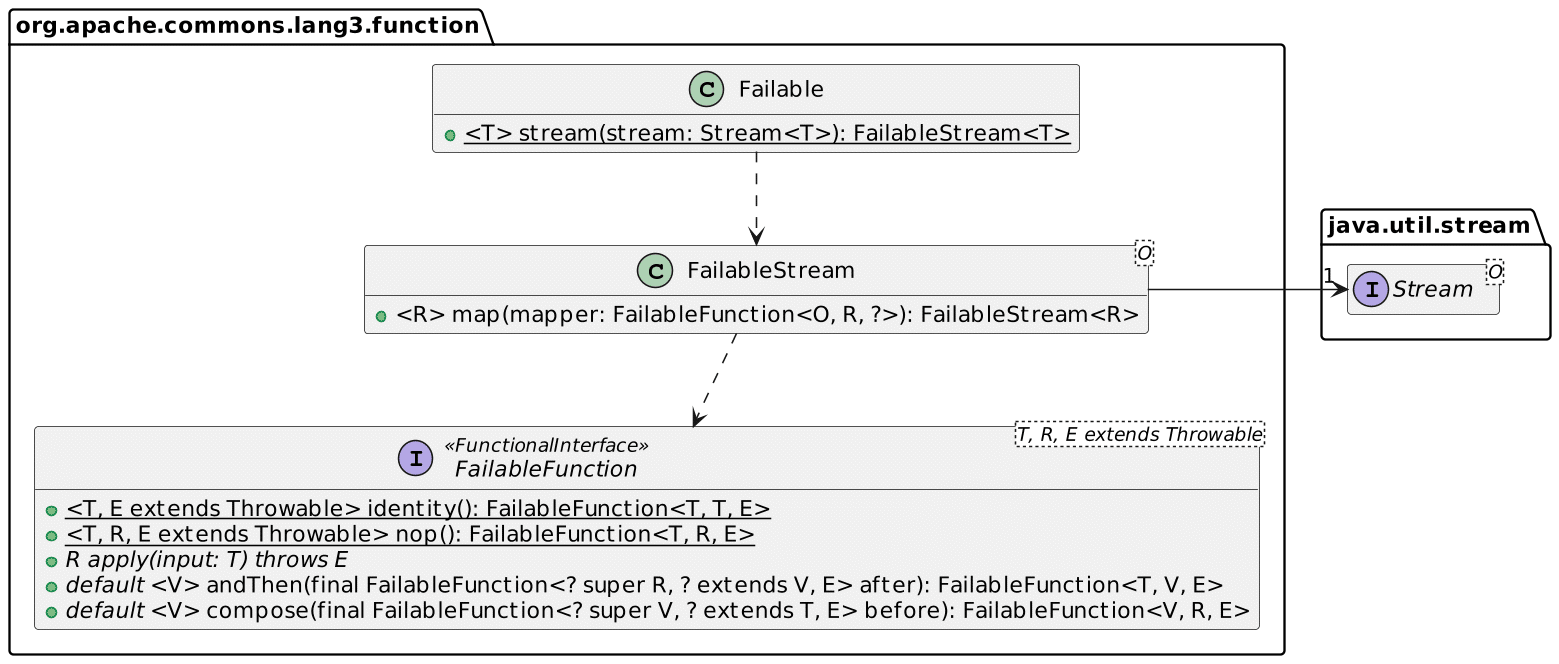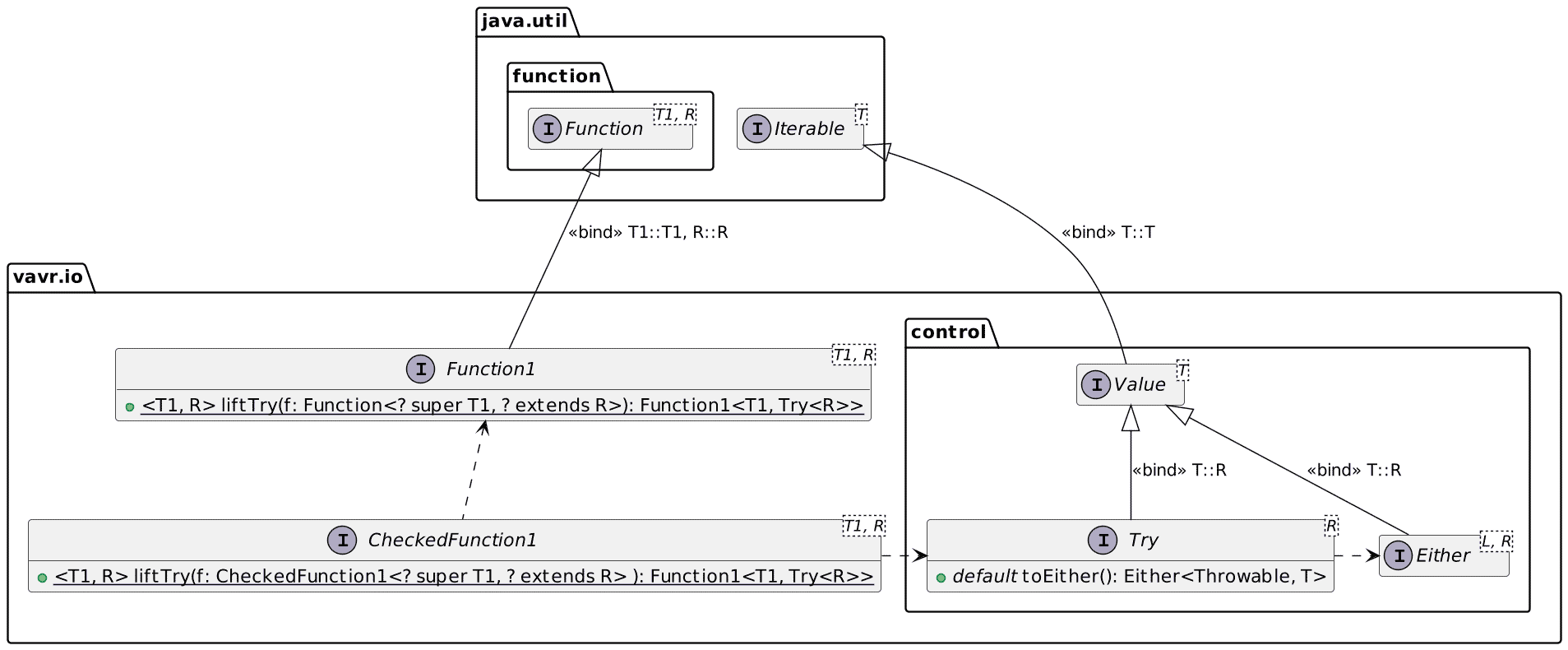Exceptions in Java Lambdas
- October 22, 2022
- 4745 Unique Views
- 4 min read
Java introduced the concept of checked exceptions. The idea of forcing developers to manage exceptions was revolutionary compared to the earlier approaches.
Nowadays, Java remains the only widespread language to offer checked exceptions. For example, every exception in Kotlin is unchecked.
Even in Java, new features are at odds with checked exceptions:the signature of Java's built-in functional interfaces doesn't use exceptions.It leads to cumbersome code when one integrates legacy code in lambdas.It's evident in Streams.
In this article, I'd like to dive deeper into how one can manage such problems.
The problem in the code
Here's a sample code to illustrate the issue:
Stream.of("java.lang.String", "ch.frankel.blog.Dummy", "java.util.ArrayList")
.map(it -> new ForNamer().apply(it)) // 1
.forEach(System.out::println);
- Doesn't compile: need to catch the checked
ClassNotFoundException
We must add a try/catch block to fix the compilation issue.
Stream.of("java.lang.String", "ch.frankel.blog.Dummy", "java.util.ArrayList")
.map(it -> {
try {
return Class.forName(it);
} catch (ClassNotFoundException e) {
throw new RuntimeException(e);
}
})
.forEach(System.out::println);
Adding the block defeats the purpose of easy-to-read pipelines.
Encapsulate the try/catch block into a class
To get the readability back, we need to refactor the code to introduce a new class. IntelliJ IDEA even suggests a record:
var forNamer = new ForNamer(); // 1
Stream.of("java.lang.String", "ch.frankel.blog.Dummy", "java.util.ArrayList")
.map(forNamer::apply) // 2
.forEach(System.out::println);
record ForNamer() implements Function<String, Class<?>> {
@Override
public Class<?> apply(String string) {
try {
return Class.forName(string);
} catch (ClassNotFoundException e) {
return null;
}
}
}
- Create a single record object
- Reuse it
Trying with Lombok
Project Lombok is a compile-time annotation processor that generates additional bytecode. One uses the proper annotation and gets the result without having to write boilerplate code.
Project Lombok is a java library that automatically plugs into your editor and build tools, spicing up your java. Never write another getter or equals method again, with one annotation your class has a fully featured builder, Automate your logging variables, and much more.
Lombok offers the @SneakyThrow annotation:it allows one to throw checked exceptions without declaring them in one's method signature.Yet, it doesn't work for an existing API at the moment.
If you're a Lombok user, note that there's an opened GitHub issue with the status parked.
Commons Lang to the rescue
Apache Commons Lang is an age-old project.It was widespread at the time as it offered utilities that could have been part of the Java API but weren't.It was a much better alternative than reinventing your DateUtils and StringUtils in every project.While researching this post, I discovered it is still regularly maintained with great APIs.One of them is the Failable API.
The API consists of two parts:
- A wrapper around a
Stream - Pipeline methods whose signature accepts exceptions
Here's a small excerpt:

The code finally becomes what we expected from the beginning:
Stream<String> stream = Stream.of("java.lang.String", "ch.frankel.blog.Dummy", "java.util.ArrayList");
Failable.stream(stream)
.map(Class::forName) // 1
.forEach(System.out::println);
Fixing compile-time errors is not enough
The previous code throws a ClassNotFoundException wrapped in an UndeclaredThrowableException at runtime. We satisfied the compiler, but we have no way to specify the expected behavior:
- Throw at the first exception
- Discard exceptions
- Aggregate both classes and exceptions so we can act upon them at the final stage of the pipeline
- Something else
To achieve this, we can leverage the power of Vavr. Vavr is a library that brings the power of Functional Programming to the Java language:
Vavr core is a functional library for Java. It helps to reduce the amount of code and to increase the robustness. A first step towards functional programming is to start thinking in immutable values. Vavr provides immutable collections and the necessary functions and control structures to operate on these values. The results are beautiful and just work.
-- Vavr
Imagine that we want a pipeline that collects both exceptions and classes. Here's an excerpt of the API that describes several building blocks.

It translates into the following code:
Stream.of("java.lang.String", "ch.frankel.blog.Dummy", "java.util.ArrayList")
.map(CheckedFunction1.liftTry(Class::forName)) // 1
.map(Try::toEither) // 2
.forEach(e -> {
if (e.isLeft()) { // 3
System.out.println("not found:" + e.getLeft().getMessage());
} else {
System.out.println("class:" + e.get().getName());
}
});
- Wrap the call into a Vavr
Try - Transform the
Tryinto anEitherto keep the exception. If we had not been interested, we could have used anOptionalinstead - Act depending on whether the
Eithercontains an exception, left, or the expected result, right
So far, we have stayed in the world of Java Streams. It works as expected until the forEach, which doesn't look "nice".
Vavr does provide its own Stream class, which mimics the Java Stream API and adds additional features. Let's use it to rewrite the pipeline:
var result = Stream.of("java.lang.String", "ch.frankel.blog.Dummy", "java.util.ArrayList")
.map(CheckedFunction1.liftTry(Class::forName))
.map(Try::toEither)
.partition(Either::isLeft) // 1
.map1(left -> left.map(Either::getLeft)) // 2
.map2(right -> right.map(Either::get)); // 3
result._1().forEach(it -> System.out.println("not found: " + it.getMessage())); // 4
result._2().forEach(it -> System.out.println("class: " + it.getName())); // 4
- Partition the
StreamofEitherin a tuple of twoStream - Flatten the left stream from a
StreamofEitherto aStreamofThrowable - Flatten the right stream from a
StreamofEitherto aStreamofClass - Do whatever we want
Conclusion
Java's initial design made plenty of use of checked exceptions. The evolution of programming languages proved that it was not a good idea.
Java streams don't play well with checked exceptions. The code necessary to integrate the latter into the former doesn't look good. To recover the readability we expect of streams, we can rely on Apache Commons Lang.
The compilation represents only a tiny fraction of the issue. We generally want to act upon the exceptions, not stop the pipeline or ignore exceptions.In this case, we can leverage the Vavr library, which offers an even more functional approach.
You can find the source code for this post on GitHub.
To go further:
- Exceptions in Java 8 Lambda Expressions
- How to Handle Checked Exceptions With Lambda Expression
- "Stackoverflow: Java 8 Lambda function that throws exception?"
- Failable JavaDoc
- Vavr
- Exceptions in Lambda Expression Using Vavr
- Java Streams vs Vavr Streams
Originally published at A Java Geek on October 16th, 2022
Don’t Forget to Share This Post!







Comments (0)
No comments yet. Be the first.